In addition to war, Seinfeld and Ben & Jerry’s Ice Cream, America is known for its sports fanaticism. Nothing unites this melting pot of socially siloed people than wearing overpriced tribal colours at modern coliseums and having a collective meltdown whenever their overpaid gladiators risk death and dignity through the handling of a ball.
Sports as a form of politics-laden “war” isn’t the most subtle metaphor, but Ben Passmore’s Sports is Hell shows that tackling it (sorry) head-on with humour can turn literary groans into moans (not sorry!). After a power outage ends a Super Bowl game between the Big White and the Birds, led by Kaepernick stand-in Marshall Quandary Collins, a riot breaks out over claims of the real winner. This snowballs into urban warfare fought among various factions representing America’s different positions on race, police brutality, economics and political representation. We follow Kweku and a cast of figureheads for these positions as they navigate firefights and cultural discourse.
Passmore avoids reductive, blindly optimistic prescriptions for fixing America; even the incidental plot, like discourse today, runs in circles. There’s no real catharsis beyond the thrill of violence for Kweku, Questlike’s desire for a visionary leader, or the escape from danger for everybody else. One dicey situation after another forces them to try and work together, a set-up that Passmore often uses to elegantly inject dialogue about a hot-button topic. There’s a tenuous sense of direction that the story resurfaces — the desire to find Collins — the leader who can unite the people under football’s flag, even though his knee brought America ever closer to a race war (despite noble reasons).
Such noble and not-so-noble character motivations convey what Sports is Hell is about: the myopia of American discourse and actions, where entrenched positions lead to confusion and misunderstanding, and in turn, people speaking past each other. How does America crawl back from the brink?
The book hints that redemption is a matter of difficult pragmatism, which involves taking stock of the nuanced shades of grey that make up the cultural fabric of America. The characters are little more than mouthpieces, but are drawn from a broader spectrum of specificity that complicate the stark black and white (literally and figuratively) perception of culture wars. There’s black on black conflict, pitting non-violent MLK-inspired leadership against “no-masters” anarchy. Those two groups against Nation-of-Islam militancy and its intellectual contradictions regarding white Americans. There’s white-on-white conflict, between white supremacists and white liberals, and sports tribalism among white liberals. Again, little wonder American politics is so combative…
Passmore digs deeper to show just how complicated it all is by highlighting self-sabotaging contradictions — arguably the book’s strongest feature. The female lead character challenges Kewku’s appreciation for millionaire athletes who can’t “speak for nobody but rich people!”, yet he directs the same criticism at the Collins fan when he speaks out against anarchy. A white liberal couple’s awkward “allyship” with black people — the dynamics of which are genuinely laugh-out-loud — reveals the emptiness of that phrase with dialogue like, “Is it the Black Lives Matter [protest]? It’s so exciting!!!” and “my partner and I would like it if you had a united voice.” America can’t get its shit together partly because its culture warriors have a tenuous grasp of their beliefs and convictions.
Passmore’s simply, cartoony art style softens the gravitas of his themes yet accentuates the absurdity of the premise. There’s an elasticity to his drawings, especially the rickety lettering, that evokes the madcap physics of rubberband animation. It makes sense seeing anthropomorphic animals for sportscasters, or someone getting stuffed inside a barbeque grill before it blows up. The dominant use of sepia over black helps convey the playful tone, including scenes with heavy use of light and shadow to convey a sense of foreboding and suspense that would feel too noirish with the default use of black and white.
The ending feels abrupt, yet leaves us with a slight twist that’s fodder for debate — which is fitting, all things considered. Amid the story’s chaos and the exhausting noise of politics today, Sports is Hell provides an unexpected clarity on the complex schisms of modern American culture while serving up a ton of laughs. Shockingly or not — it is 2020, after all — Sports is Hell has more insightful observations and commentary than the mainstream media today.
Ben Passmore (W/A) • Koyama Press, $14.99
Review by Moe Abbas





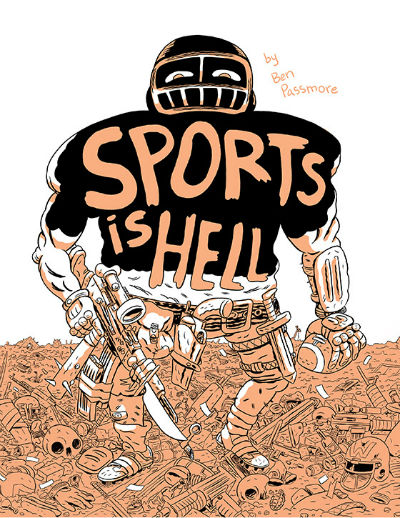
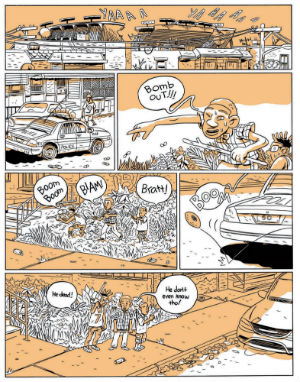
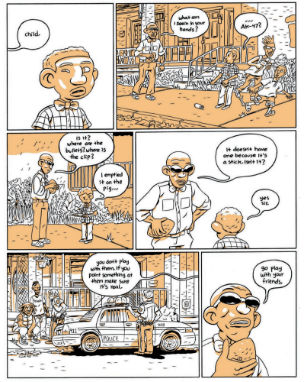
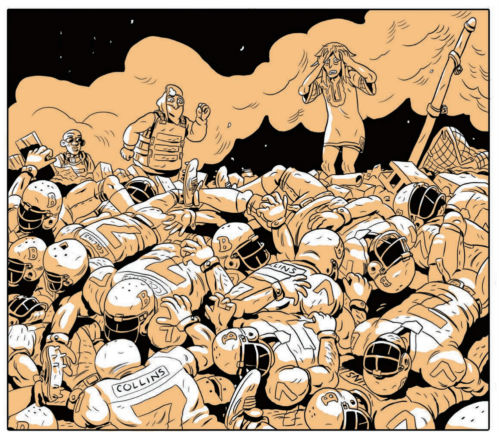
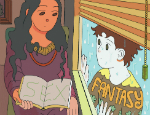
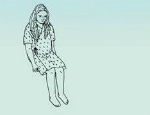
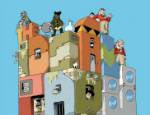
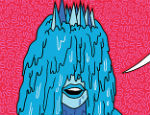


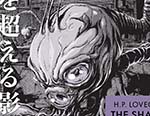

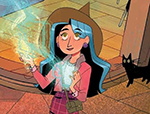
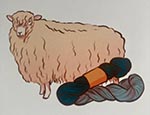
[…] the entire review right here!– – –Wisconsin Public Radio reviews Ben Passmore’s “fable of societal […]
[…] Read on BrokenFrontier.com comics journalism […]